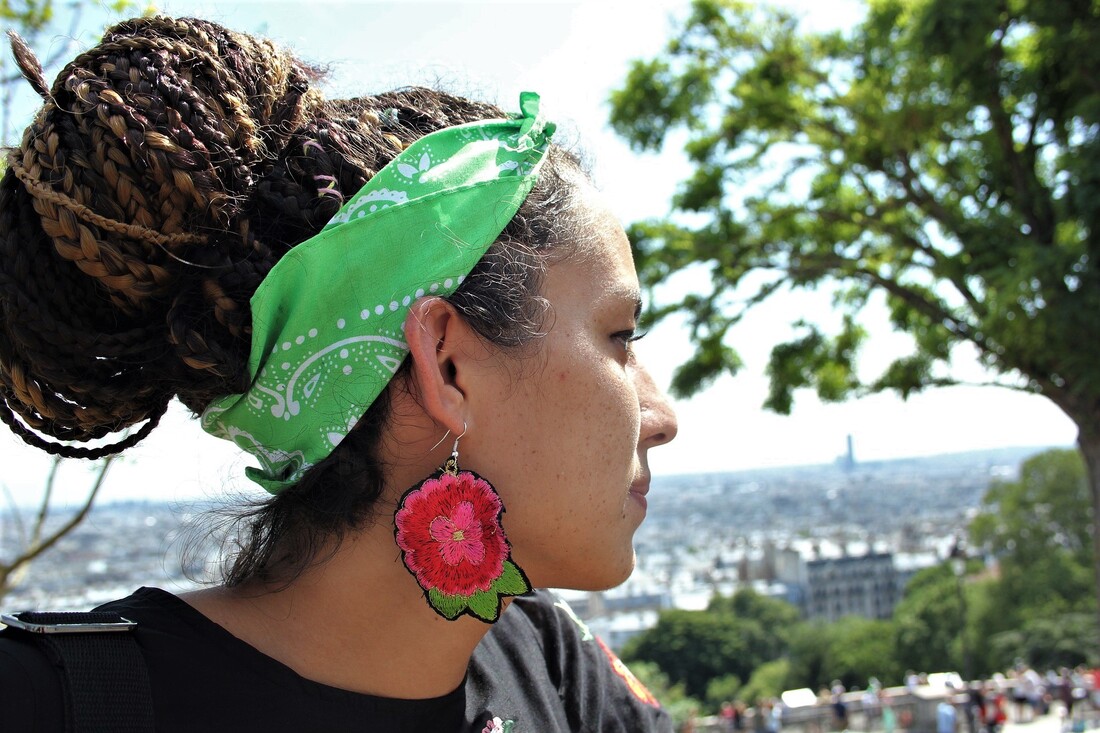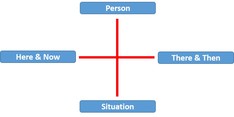|
‘To understand is to perceive patterns.’ (Isaiah Berlin) According to Gestalt psychology, human beings are hard-wired to see things in patterns. Take, for instance, a tree. If I were to invite you to imagine a tree, it’s likely you would imagine the whole tree (well, at least that part of the tree that is visible above ground). I wouldn’t imagine that you’d picture all its constituent elements separately – cells, leaves, twigs, branches etc. Unless you’re dissecting a tree in a botanical lab. It’s essentially the same idea in music. When we listen to a melody, we hear the tune as a whole, not each individual note separately from the others. In fact, if we were to examine each note in turn in isolation, it’s unlikely we’d be able to discern what melody they form part of when clustered together in a specific configuration. Except, perhaps, if we’re learning to play an instrument and focusing intently on one note at a time. Now this intuitive ability can be a real gift when working with teams, groups, organisations – or even making sense of geopolitics. It means learning to step back from the immediate issue or event and, metaphorically, to narrow our eyes into a near-squint to allow a bigger picture, a wider system, a deeper meaning, the wood for the trees, to emerge. Khalil Gibran observed, ‘the mountain is clearer to the climber from the plain.’ I recognised this phenomenon at work this last week when, in the Netherlands for the first time, the more I relaxed and allowed the language to flow over me, the more of it I could understand. When I paid too much attention to individual words, the more I got stuck. There are parallels in Timothy Gallwey’s Inner Game. Beware paralysis of analysis. Take a breath, relax your grip and notice what surfaces into awareness.
10 Comments
‘One fish asks another fish ‘How is the water?’ The two swim on for a bit and eventually the other fish replies, ‘What is water?’’ (David Foster Wallace) The more I know, the less I understand. That’s the conclusion I came to after spending 5 years in a Christian faith community in London with 70% Nigerian people, 20% Ghanaian, 8% Mauritian and 2% from the UK. It’s a belief that’s been reinforced by 7 years closely alongside people from the Philippines and other countries in East and South East Asia. Beyond surface-level cultural traits such as distinctive clothing and food, culture runs very deep, mostly well below the radar of conscious awareness. Like the values and beliefs that underpin it, culture often only becomes known, including to ourselves, when we encounter a person or situation that contradicts or clashes with it. It can take us by surprise. I’ve made various cross-cultural blunders on route, ranging from an innocent hug in one context to posing questions in a group in another. On reflection, I’ve sometimes been astounded by my own naivety. Yet few opportunities for learning compare with a cross-cultural experience. It may feel like a bumpy ride on route yet the results can be transformational. [See also: Cross-cultural coaching; Crossing cultures; Cross-cultural action learning] ‘Think of your techniques as toys rather than tools.’ (Brian Watts) This was an insightful, inspiring and innovative coach who had a gift for working at the learning edge, the leading edge, the sometimes bleeding edge. I had the pleasure of working with him as a close colleague and as a client. For me, it was a profound, at times disconcerting, and yet often invigorating learning experience. It challenged my ingrained, default ways of thinking about and doing my work. It also gave me my first experiential taste of the power of Gestalt. His approach started with a simple and open invitation, ‘Be free, creative and experimental. See what happens. Let the child play!’ His conviction was that transformation takes place (a) through experiential learning, and (b) at what is, for the client, his or her own learning edge. It’s that frontier horizon at which we place our self- and culturally-imposed limits. It’s the stretched and stretching place where we may discover our own subconscious psychological defences too. I talked about a forthcoming meeting with an executive team. I was new in my career and found the anticipation of this encounter very anxiety-provoking. The coach invited me to leave the room, then to step back in as if entering the executive meeting room itself. When I did so, he observed (to my surprise) that I was holding my hand across my chest, as if protecting my heart. ‘How would it be if you were to reveal your heart in that meeting?’ I did so, and that transformed everything. In the creative, experimental spirit that lays at the heart of Gestalt coaching, he reminded me, ‘Sometimes these things will fall flat. It’s always a leap of faith.’ It’s a suck-it-and-see approach: try something new and see what may emerge into awareness. It taught me that learning has rational, emotional, intuitive, imaginative and somatic dimensions. I discovered I stand to learn most when I take a risk, when I dare to step out and beyond my natural-instinctive learning mode. Curious to experience the power of Gestalt? Get in touch! [For more examples of Gestalt coaching in practice, see: Just do it; Crab to dolphin; Let's get physical] ‘Your choice point is the space you're in right before you make a decision.’ (Martha Tesema) You are choosing to read this blog – you could have chosen to do something else instead. You are choosing to read it now – you could have chosen to read it at a different time. In fact, according to psychological choice theory, everything you do is a choice. You’re not always aware of it and it won’t always feel like it. The implications and consequences of choosing one course of action over another can sometimes be so different and so stark that it can feel to, to all intents and purposes, as if there is no choice. Yet you are still likely to choose the action that, for instance, aligns most closely with your values; or has the greatest perceived benefits; or has the least risks or detrimental effects. The implications of this theory are radical and extreme. If every action you take represents a choice, and if you can grow in awareness of the choices you are making at each moment, a vast array of possibilities opens up to you. As you approach any decision, it will be like reaching a road junction, with always at least 2 options available to you. You will no longer be trapped or driven entirely by circumstances. You can exercise greater freedom and personal agency. You can learn to navigate adaptively through choices, like tacking into the wind on a sailboat. You can become more creative and innovative. You can visit places, reach destinations, that you never dreamed imaginable. There is a flip side. If you really are free to choose, you’re also responsible for your every action. It could feel easier to tell yourself that you have no choice – especially since you can’t anticipate every potential ripple effect. It would relieve you of the burden of accountability. You could also feel quite overwhelmed by the dread of having to make choices at every moment in time, in every situation. It could feel like existentialist Jean-Paul Sartre’s nightmare, ‘condemned to be free’. You may try to alleviate the anxiety by telling yourself that you’re a product of your background, upbringing, culture or circumstances. Then you could stop over-thinking, over-analysing, and get on with your life. So, how to handle this paradox? How to create the liberating freedom of expanding one’s sense and reality of choice whilst also to acknowledge the ethical and practical responsibilities it carries with it? First: awareness. Here’s a simple exercise. Write down a paragraph of no more than 100 words that describes the last meeting you had with a colleague. Now, underline every word that represents a choice point in what happened. If you do this rigorously enough, you will be amazed at how much of the text is highlighted. Now the stretch, a thought experiment: jot down at least 2 different choices you could have made at each choice point. Try to be creative and courageous as you do this. Second: responsibility. To build on this exercise, jot down a list of key criteria that will help you to ensure focus, priorities and boundaries to your decisions and actions. Here are some examples: ‘make best use of my time; achieve my career goals; develop the team’s potential; improve quality of relationships; create best value for stakeholders’. These criteria reflect and represent your values. Finally, test the actual choices you made, and the hypothetical choices you could have made, against these criteria to take note of what you could have done differently, what you could do next time and what lines you will not cross. Now – it’s your choice: given what you know now, what will you do with it? (See also: Choose; Choice; Agents of Change) The best of intentions. How often we do things with good motives and yet, in spite of that, our actions have unintended consequences. It’s often because we haven’t known or understood the wider implications of what, where, when, how or with-for whom we do something. We may, for instance, offer support to a specific person, team or group…only to discover that a different person, team or group perceives that intervention as partisan, favourit-ist or creating unfair advantage.
Here’s an extreme. A friend was delivering aid to a poverty-stricken village in Sudan when he was stopped at gunpoint by militia from a neighbouring village. He was forced to the ground with rifle barrel pressed hard against the back of his head whilst the group relieved him of the vehicle and relief supplies. It turns out the group and its community were envious and resentful that they were being effectively ignored whilst supplies were being provided to a different village. Or here’s a less extreme example. I spoke with an emotional intelligence (EI) specialist this week about using psychological mentoring, coaching and tools to raise awareness and insight, with a risk that some clients may use it in weaponised form to manipulate colleagues or customers. It points to a real need to pay attention to wider systemic, cultural, ethical, political and longer-term considerations when seeking to do the right thing – a principle known as ‘primum non nocere’. If you’re a leader, coach, OD or trainer, here are some questions for critical reflection: When have you acted in good faith to resolve one issue, only to discover that your interventions have inadvertently incentivised, precipitated or exacerbated another? How do you manage the tension of never fully knowing or understanding the potential implications of everything – and yet still taking meaningful stances, decisions and actions? What is your best advice on ‘do no harm’? Take a clean sheet of flipchart paper. Draw a small black dot in the middle. Ask people what they see, what they notice. Almost invariably in my experience, people will say, ‘A black dot’. I haven’t yet heard someone say, ‘A white sheet of paper’. I first saw this used in an anti-racism workshop. The tutor, Tuku Mukherjee, used it as a metaphor for how we tend to focus our attention on minorities in society and ignore or don’t even see the majority. The backdrop is, in effect, invisible to us.
In this example, the backdrop forms the context for the ‘minority’. In other words, ‘minority’ only has meaning vis a vis a perceived ‘majority’. I heard one astute black speaker say, ‘In the UK, I am viewed as an ethnic minority whereas, when I look across the world as a whole, I see that I am part of an ethnic majority.’ So what we see, what sense we make of it, is contextual. To understand what we notice, we sometimes need to shift our focus to the background against which it stands out. Take, now, an example of a person who is ‘underperforming’ at work. This definition of the situation locates underperformance in the person, as if it represents a quality, aptitude or behaviour of the person him or herself. It leads us to consider how to improve the person’s performance, e.g. through mentoring or training. All things being equal, this may improve the person’s performance and, if so, we may view the situation as resolved. ‘X was underperforming…X is now performing…sorted.’ Yet what constitutes ‘good performance’ is defined by the backdrop, the wider organisation. What if performance expectations are unrealistic? What if the person does not have sufficient resources, guidance or support? What if systems, policies or procedures are such that they make the person’s work untenable? What if relationships or power dynamics are culturally toxic? What if instances of ‘under-performance’ form a repeating pattern in this organisation or team? Step back…look…see. Ignorance is bliss - until we realise our ignorance. Therein lies a painful paradox at the crux of films like, The Matrix and Vanilla Sky. There can be something deeply unsettling, disorientating, releasing about a dramatic shift in awareness like a sudden waking from sleep. Our eyes are opened, we can see and now we face fresh possibilities, choices and responsibilities. Ironically, the existentialist French philosopher Jean-Paul Sartre described this experience bleakly as, ‘condemned to be free.’
This awareness-raising phenomenon raises important practical and ethical questions for those working in people professions. The Brazilian educator, Paulo Freire, emphasised the importance of 'conscientisation', critical consciousness-raising, as a means to liberation. He argued that people are in some ways unaware of themselves, their circumstances, until enabled to see through fresh eyes. This resonates with a Chinese proverb: ‘If you want to know what water is, don’t ask a fish’. A girl I was working with recently from a very different cultural background to my own reinforced this point: ‘I didn’t see myself until you saw me.’ Her interactions with me as an outsider enabled her to see herself in a new light – as if for the first time. This idea of metaphorically (and sometimes literally) stepping back to notice what we had previously not noticed, to critique and reframe our insights and experiences, to open up new choices and actions, is at the heart of reflective practice. Yet someone challenged me strongly on the ethics of this last night: ‘Who are we to raise others’ awareness like this? What if it leads them to be less happy, more frustrated in life?’ If we enable people to reflect, critique and de/reconstruct their current realities, what if they and others experience the net impact as negative? Is it always true that it is better to be aware than to be unaware? Who makes that decision? If you work with people, I’d love to hear your thoughts and ideas on this! If you love 2 x 2 models, you will love this. Maybe. I led a group supervision session this afternoon for coaches throughout the UK. As a prompt for contracting, signposting and focusing, I drew a simple grid with 2 polarities: (a) Person – Situation and (b) Here & Now – There & Then. We can think of 'Here & Now' as in the room; 'There & Then' as in the situation or story. This creates 4 permeable zones of interest and inquiry for supervision and coaching and potential prompts for reframing. I’ll offer some sample questions below that can be used or adapted in each zone: Person – Here & Now. How is this situation impacting on you here and now? As you talk about this now, what stands out as most important to you? What are you aware of here and now? How are you feeling now as you talk about this? Which aspect of this would you like to focus on here and now? Person – There & Then. What role are you playing in this situation? What responsibility are you taking for what’s happening? What outcome are you hoping for in this situation? What are you noticing and not-noticing in this situation? What critical strengths is this calling for from you? Situation – Here & Now. What is the current situation? Who is influencing, involved in or impacted by the situation and how? What opportunities and challenges are emerging in this situation here and now? Which aspects of the situation are most important to pay attention to at the moment? Situation – There & Then. What’s the back story to this situation? What goals and outcomes were identified at the outset? If this project was to be successful, what would success look and feel like for different stakeholders? What professional and policy issues will need to be taken into account? 'What are you not noticing?’ What an odd question. How can I notice what I’m not noticing? It sounds, feels, like a paradox. I first heard this question during a Gestalt workshop posed by the legendary Malcolm Parlett. And then, next: ‘What are we not talking about?’ So now we’re supposed to talk about what we’re not talking about?! Weird. Mind-bending. An intriguing adventure.
I took part in a workshop with Tuku Mukherjee. He drew a black dot in the middle of a blank sheet of flipchart paper. What did we see? 'A black dot'. What did we not notice? The white background. Or you may have tried the selective attention test where you are invited to watch a basketball game and count the number of bounces or passes. How is it that we miss the gorilla walking by? Such insights and ideas sparked the start of my own journey into not-noticing. What am I not noticing? It has profoundly influenced my leadership, OD and coaching practice. What are we noticing? What is captivating us, holding our attention? What have we become fixated by? And, What are we not noticing? Who or what is lying in the background, hidden in plain sight? Our noticing is filtered by e.g. language, beliefs, values, assumptions, cultures, paradigms, interests, experiences, expectations and emotional states. Not-noticing enables us and our clients to focus, simplify and make sense of the world. Yet it can blind us to all kinds of insights, ideas and possibilities. Noticing not-noticing can be liberating and powerful. What are you not noticing? I once trained with Mark Sutherland, a supervisor and psychotherapist, who shared the image of a client as someone floating out at sea on a raft. Whereas some coaches may swim out to rescue the client, to pull the raft back to safer shores so to speak, Mark saw his role by contrast as simply joining the person on the raft: ‘Two people…wondering together.’ For many years now, I’ve found that image incredibly attractive and releasing.
A good friend and colleague, Ian Henderson (Eagle Training), uses a similar principle when drawing on NLP to evoke curiosity in a training group. He may open an event by telling an evocative story at the outset, without introduction or explanation, then stop the story at a critical juncture and shift focus to the formal agenda. It leaves the group surprised, confused and curious…and it’s that state of curiosity that draws the group into deep learning. A very similar principle attracts me to Gestalt, a coaching approach that involves active, physical experimentation with a client or group. The key to the experiment is to follow your intuition, support the client’s intuition, go with the flow, be playful and creative, let go of control. It means trusting the moment, the dynamic between you, and seeing what happens. I’m continually amazed by what surfaces into awareness and what changes take place. So picture the coach, the leader, the facilitator or trainer as someone whose role is to evoke curiosity, to enable the client, the team colleague, the group, to wonder. It is a child-like quality that can lead to all kinds of exciting adventures and discoveries. It entails suspending what we know, the pressure to know, and surfacing the power, the gift of not-knowing, allowing the unexpected to emerge – and noticing the newness that is revealed. |
Nick WrightI'm a psychological coach, trainer and OD consultant. Curious to discover how can I help you? Get in touch! Like what you read? Simply enter your email address below to receive regular blog updates!
|








 RSS Feed
RSS Feed